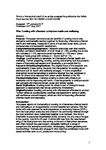Cooking with offenders to improve health and well-being
Date
2017-05-02Author
Subject
Metadata
Show full item recordAbstract
<jats:sec> <jats:title content-type="abstract-subheading">Purpose</jats:title> <jats:p>The purpose of this paper is to demonstrate the benefits of cooking one-to-one, alongside commensality (eating together) for improving offenders’/ex-offenders’ health and well-being, measured in terms of improved social skills, cultural competencies and successful resettlement.</jats:p> </jats:sec> <jats:sec> <jats:title content-type="abstract-subheading">Design/methodology/approach</jats:title> <jats:p>Fieldwork conducted over nine months included; participant observation of lunch times (<jats:italic>n</jats:italic>=56) and cooking one-to-one with trainees (<jats:italic>n</jats:italic>=27), semi-structured interviews (<jats:italic>n</jats:italic>=23) and a “photo-dialogue” focus group with trainees (<jats:italic>n</jats:italic>=5) and staff (<jats:italic>n</jats:italic>=2).</jats:p> </jats:sec> <jats:sec> <jats:title content-type="abstract-subheading">Findings</jats:title> <jats:p>Commensality is beneficial for offenders’ health and well-being. Further, preparing, cooking, serving and sharing food is a powerful means of improving self-esteem and developing a pro-social identity.</jats:p> </jats:sec> <jats:sec> <jats:title content-type="abstract-subheading">Research limitations/implications</jats:title> <jats:p>The original focus of the research was commensality; it was during the study that the potential for cooking as an additional tool for health and well-being emerged. A future longitudinal intervention would be beneficial to examine whether the men continued to cook for others once released from prison and/or finished at the resettlement scheme.</jats:p> </jats:sec> <jats:sec> <jats:title content-type="abstract-subheading">Practical implications</jats:title> <jats:p>Everyday cooking to share with others is an invaluable tool for improving self-worth. It has the potential to build pro-social self-concepts and improve human, social and cultural capital.</jats:p> </jats:sec> <jats:sec> <jats:title content-type="abstract-subheading">Social implications</jats:title> <jats:p>Cooking lunch for others is a part of strengths-based approach to resettlement that values community involvement.</jats:p> </jats:sec> <jats:sec> <jats:title content-type="abstract-subheading">Originality/value</jats:title> <jats:p>Cooking and eating with offenders/ex-offenders is highly unusual. Further hands-on cooking/eating activities are beneficial in terms of aiding self-confidence and self-respect, which are vital for improving offenders’/ex-offenders’ health and well-being.</jats:p> </jats:sec>
Collections
Publisher
Journal
Volume
Issue
Pagination
Recommended, similar items
The following license files are associated with this item:


